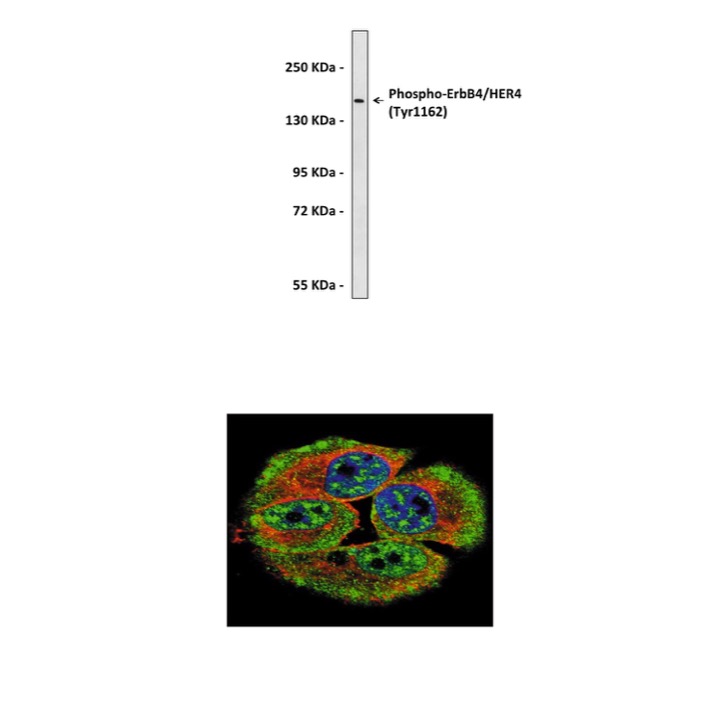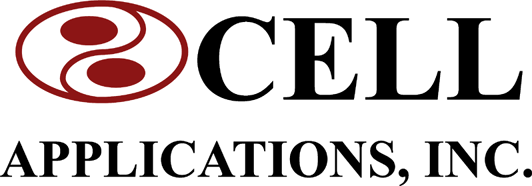Product Sheet CG1197
Description
BACKGROUND ErbB4 is a member of the epidermal growth factor receptor (EGFR, ErbB) family that mediates responses to neuregulins and other EGF-like growth factors. It is a central regulator of cardiovascular and neural development as well as differentiation of the mammary gland. A role for ErbB4 has also been implicated in malignancies and heart diseases. Although expression of the ErbB4 receptor tyrosine kinase in breast cancer is generally regarded as a marker for favorable patient prognosis, controversial exceptions have been reported. Alternative splicing of ErbB4 pre-mRNAs results in the expression of distinct receptor isoforms with differential susceptibility to enzymatic cleavage and different downstream signaling protein recruitment potential that could affect tumor progression in different ways. Four structurally and functionally distinct ErbB4 isoforms have recently been identified.1
ErbB4 is activated by binding of growth factors in the EGF family, which are encoded by at least nine genes. The ligand-activated receptors can signal either through homodimerization or through heterodimerization with other EGFR family members. Each receptor/ligand combination has the potential to recruit and activate a unique set of interacting proteins, thereby initiating signaling cascades which culminate in distinct cellular responses.2 Phosphorylation of ErbB4 Tyr1056 is necessary and appears to be sufficient for ErbB4 function and is critical for coupling ErbB4 to prostate tumor suppression.3 Autophosphorylation of other C-terminal tyrosines including Tyr1162, Tyr1188, Tyr1258, and Tyr1284 in ErbB4 may provide a docking site for downstream signaling components.4
ErbB4 is activated by binding of growth factors in the EGF family, which are encoded by at least nine genes. The ligand-activated receptors can signal either through homodimerization or through heterodimerization with other EGFR family members. Each receptor/ligand combination has the potential to recruit and activate a unique set of interacting proteins, thereby initiating signaling cascades which culminate in distinct cellular responses.2 Phosphorylation of ErbB4 Tyr1056 is necessary and appears to be sufficient for ErbB4 function and is critical for coupling ErbB4 to prostate tumor suppression.3 Autophosphorylation of other C-terminal tyrosines including Tyr1162, Tyr1188, Tyr1258, and Tyr1284 in ErbB4 may provide a docking site for downstream signaling components.4
REFERENCES
1. Muraoka-Cook, RS et al.: J Mammary Gland Biol Neoplasia.13:235-46, 2008
2. Kaushansky, A et al.: Chem. Biol. 15: 808-817, 2008
3. Gallo, RM et al.: Biochem. Biophy. Res Commun. 349: 372-382, 2006
4. Kaushansky,A. et al: Chem. Biol. 15:808-17, 2008
2. Kaushansky, A et al.: Chem. Biol. 15: 808-817, 2008
3. Gallo, RM et al.: Biochem. Biophy. Res Commun. 349: 372-382, 2006
4. Kaushansky,A. et al: Chem. Biol. 15:808-17, 2008
Products are for research use only. They are not intended for human, animal, or diagnostic applications.

(Click to Enlarge)
Top: HER4 Antibody (pY1162) western blot analysis in Mouse NIH-3T3 cell line lysates (35 μg/lane). Bottom: Confocal immunofluorescent analysis of Phospho-HER4-Y1162 Antibody with MCF-7 cell followed by Alexa Fluor 488-conjuGoated Goat Anti-Rabbit lgG (green). Actin filaments have been labeled with Alexa Fluor 555 phalloidin (red).DAPI was used to stain the cell nuclear (blue).
Details
Cat.No.: | CG1197 |
Antigen: | This HER4 Antibody is generated from rabbits immunized with a KLH conjugated synthetic phosphopeptide corresponding to amino acid residues surrounding Y1162 of human HER4. |
Isotype: | Rabbit IgG |
Species & predicted species cross- reactivity ( ): | Human |
Applications & Suggested starting dilutions:* | WB 1:1000 IP n/d IHC 1:50-1:100 ICC n/d FACS n/d IF 1:10-1:50 |
Predicted Molecular Weight of protein: | 146808 Da |
Specificity/Sensitivity: | Detects endogenous ErbB4 proteins without cross-reactivity with other family members. |
Storage: | Store at -20°C, 4°C for frequent use. Avoid repeated freeze-thaw cycles. |
*Optimal working dilutions must be determined by end user.
Products
| Product | Size | CAT.# | Price | Quantity |
|---|---|---|---|---|
| Rabbit ErbB4/HER4 Phospho-Tyr1162 Antibody: Rabbit ErbB4/HER4, Phospho-Tyr1162 Antibody | Size: 100 ul | CAT.#: CG1197 | Price: $384.00 |
